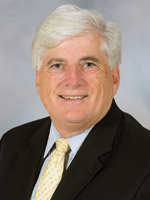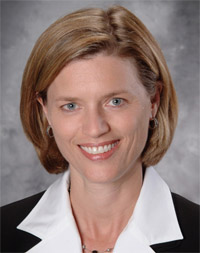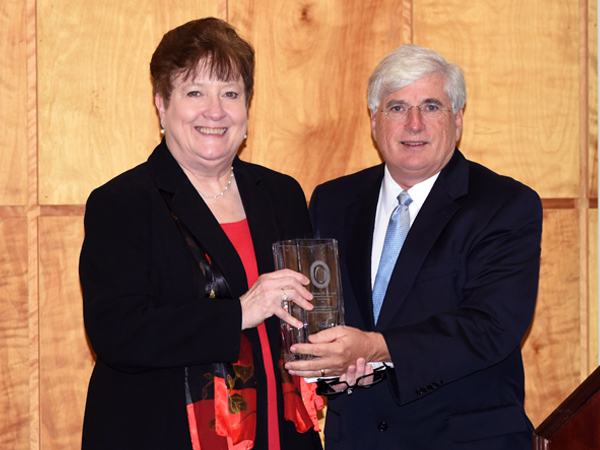SGSHS distinguished alum shows public health passion

Opportunity and serendipity have positioned Dr. Kaye Bender to become a national leader in improving the nation's public health programs.
“Sometimes you find yourself in wonderful circumstances, and you take a few risks, and doors open,” said Bender, president and chief executive officer of the Public Health Accreditation Board, the only and first nonprofit organization that accredits state, local, tribal and territorial health departments.
It's just one lesson she shared with students and faculty Oct. 28 while accepting the honor of 2016 Distinguished Alumnus of the School of Graduate Studies in the Health Sciences.
“Dr. Bender has had an extraordinary career in various state and national leadership roles,” said Dr. Joey P. Granger, dean of the graduate school. “The goal of her speech was to demonstrate to our students how critical skills learned in our Ph.D. programs can be used in various career paths.”

While pursuing her Ph.D. in clinical health sciences at the University of Mississippi Medical Center, Bender was asked to serve as the chair of a research committee in Washington D.C. to explore accreditation for health departments. This invitation was based on much earlier work she had done with two Institute of Medicine Committees. In doing that study, she made connections that eventually led her to the Public Health Accreditation Board, which is funded by the Robert Wood Johnson Foundation and the Centers for Disease Control and Prevention. Prior to this role, Bender served as the dean of the University of Mississippi School of Nursing from 2003 to 2009.
A Laurel native, Bender said she got into nursing like many did before her. She started as a candy striper at a hospital in Laurel in 1966 because a friend was doing it, and she fell in love with the work. “Because it was a charity hospital, it sparked my interest in public health and caring for the less fortunate,” said Bender.
Bender earned her BSN at UMMC, followed by a stent at a private hospital in Jackson in maternal and child health. “I again became aware of the differences in how some patients were able to have access to care and some weren't,” she said. “After a while it bothered me.”
She soon had the opportunity to work for the Mississippi Department of Health on a teen pregnancy prevention project, which she said is when she really became hooked on public health. Bender worked for MDH in several other nursing roles before earning her master of nursing at the University of Southern Mississippi. After that, she immediately started thinking about a Ph.D. She was serving the state as Deputy State Officer at the time.
Bender returned to UMMC for her Ph.D. after talking with several faculty members who told her that not only was it geared for working professionals, but that she would also have some choice in preparing papers and writing her dissertation.
“I loved that program. It was exactly what I needed at that time in my life,” she said. The flexibility of the program allowed her to combine her two passions, her interest in public health as well as her clinical background in child and maternal health.

It also allowed her to become friends with Dr. Kim Hoover, current dean of the School of Nursing. “Kaye and I met during our Ph.D. program. There's nothing like the bond that develops over statistics,” said Dr. Hoover. “Over the years, we have relied on each other for both support and advice. When she was considering applying for the dean's position [in 2003], she called me and asked me what I thought. I'm glad I told her that I thought it was a good idea.” Bender later helped recruit Hoover to UMMC.
“The skills I learned here in the Ph.D. program and in the dissertation that I was allowed to do have allowed me to understand and lay the groundwork for the kinds of evaluation we need to do [in the PHAB],” Bender told UMMC students during her Research Day speech.
For the last seven years, not counting the years of research work that led Bender to head the PHAB, Bender has been laying the groundwork for the first accreditation for state, local, tribal, and territorial health departments. She and her team have established 97 standards and areas of responsibility for public health departments to be measured against. An interested health department conducts a self-study with the standards and submits it to be reviewed for accreditation. So far, 150 departments have received accreditation, with about 180 currently going through the process. And because it's a voluntary process on the part of the department, PHAB receives new applications weekly.
The accreditation is good for five years, and the first group will be up for reaccreditation in 2018. The PHAB team is beginning the process of what reaccreditation will involve.
Accreditation, while still not legally required, shows that a health department is a high performing one, and the department can then use the designation to promote its work and apply for grants, for example. More specific results of accreditation vary by region and by departments, depending on their goals. Some departments have improved their response to national disasters and/or diseases such as Zika; others have found holes in their own procedures that need to be addressed. Some have improved their relationship with media and health-care stakeholders. Statistically, 60% of the health departments have shown an increase in grants, and 40% have reported increased staff morale.

Bender's lesson to the students, “If you do the work you really love to do, it will probably never go away,” rings true. The original accreditation process has led to a new grant to establish the Public Health National Center for Innovations. The Center convenes think tanks to support the development, testing and dissemination of innovation models in public health. Washington, Oregon, and Ohio are on board, and each state is tackling significant issues specific to their jurisdiction and studying what is similar across the board.
The goal is that this process will create pathways for the nation's health departments to work with their communities and improve the health of their citizens. “Her national service in public health is a prime example of how our schools are having a national impact,” Granger said of Bender.
While Bender is helping create that national impact directly, she is also still having an impact here at UMMC. “One of many goals Kaye had while she was dean was to build a stronger relationship with our clinical partners on the UMMC campus,” said Hoover. “She was successful and as a result, many staff from the hospital and clinics choose to continue their education with us.”
During Research Day, Bender and a panel of judges listened to those students' presentations. Bender was impressed with not only their work and the guidance that the faculty had given - which she repeatedly said is as good, if not better, than any she's seen around the country - but also with how much the event has grown over the years.
“The work that they're doing will make a difference in the lives of people around the country,” she said. “The range is impressive, and it speaks well of the continued legacy of this institution.”
Bender finished her speech at the luncheon with a final lesson wrapped up in the Dr. Seuss quote, “Today you are you. That is truer than true. There is no one alive who is youer than you.”
“I got to observe firsthand today how much of you there is in your work,” she told students. “The passion you bring to your work-don't lose that. Don't lose the you in your work.”

Bender followed her passions, which led to a career that could make a difference in lives around the country. She left the students with one final thought along those lines.
“Whatever you do when you finish here, keep your passion going,” she said. “If you don't like what you're doing, stop doing that work and find something else that you like better.”
Former Dean of the School of Nursing, Dr. Kaye Bender's career serves as a great example to students of where hard work and passion can take them. Bender's early interest in public health took her from nursing to the Mississippi Department of Health to currently serving as the president of the Public Health Accreditation Board.


